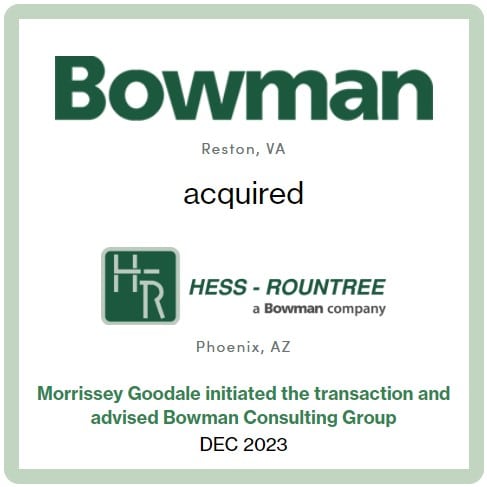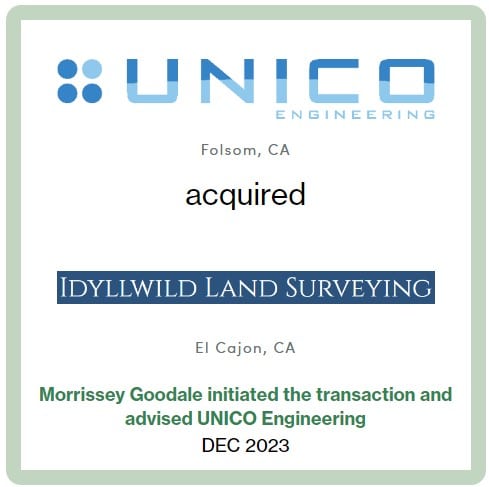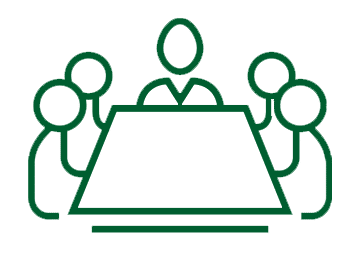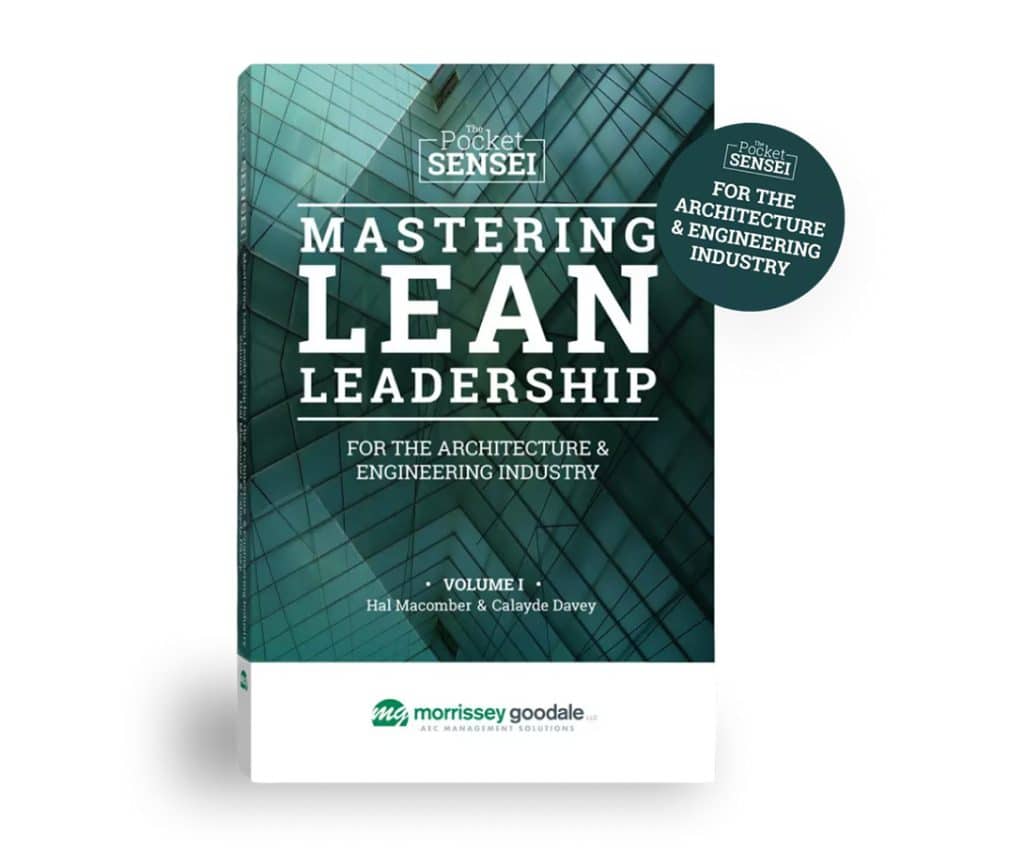Word on the street > “Shark Tank” for the AE Industry; 3 Critical Topics for 2024—And the Right Questions to Ask
Word on the Street: Issue 178
Weekly real-time market and industry intelligence from Morrissey Goodale firm leaders.

All of us here at Morrissey Goodale would like to wish you and yours a Happy Holidays! Look for the next Word on the Street on Monday, January 8.
“Shark Tank” for the AE Industry
We’ve added a ton of new features and content to our symposiums for 2024. (You can check out what’s new here.) One of the most exciting additions is the Innovation Incubator for the AE Industry, which showcases some of the industry’s most exciting new start-ups and business ideas. The concept is based on the popular TV show “Shark Tank” (except these new businesses are focused on making a big splash in the design and construction industries and we don’t have anyone who goes by the moniker “Mr. Wonderful”).
Attendees at our Southeast M&A and Business Symposium in Miami this March will not only have the opportunity to see these start-ups make their pitches from the stage, they’ll also get to vote for which is the most likely to be a break-out success. (And, who knows, one or two attendees may choose to invest in or acquire one of these start-ups.)
We’re producing this new session in collaboration with our pals at Shadow Partners (Atlanta, GA), whose mission is to drive innovation for the built environment through education, community, and thought leadership. Shadow Partners is the sister firm of Shadow Ventures, a thematic venture capital firm that invests in seed-stage ConstructionTech and PropTech companies disrupting the built world.
Shadow Partners annually runs a pre-seed incubator for start-ups and corporate start-ups. In Miami this March, the Innovation Incubator for the AE Industry will provide a “Demo Day” opportunity for these start-ups to present their business ideas to decision-makers from the AE and environmental industry.
I had the opportunity to sit down with (if by “sit down with” you mean “email back and forth with”) Jeff Echols—senior director of marketing at Shadow Partners, self-proclaimed “innovation evangelist,” and host of the Shadow Partners Incubator to discuss its genesis, how it works, and what’s going to happen in Miami.
Mick Morrissey: Jeff, can you tell us how the Shadow Partners Incubator came to be and a little bit about its history?
Jeff Echols: The incubator started over on the Shadow Ventures side as a natural outgrowth of the continuous stream of pitches (from start-ups) the fund receives. Most weeks, KP [Reddy, founder of Shadow Ventures] and Matt [Ohlman, CTO] are reviewing around 10 pitches, so one way to service the most promising of those requests is to feed them into an incubator program.
Morrissey: I know you’re quick to emphasize that the incubator includes not only start-ups but also “corporate start-ups.” Can you explain the difference? And why is it important that both are included? Can you give us some examples of corporate start-ups?
Echols: Technically, both are start-ups, but we distinguish between the two. One group is the pure or traditional start-up, and the other is a project that’s either coming out of a corporate innovation group (typically an ENR Top 500 Design Firm or an ENR Top 200 Environmental Firm) or a start-up that a firm is investing in. Either way, it’s essentially sponsored by the corporation. One reason to include both in the incubator is that the corporates have a lot to learn from the speed and flexibility of traditional start-ups. Many times, the eventual goal of the traditional start-up founders is to either be acquired by or serve the corporate as a customer. They also have a lot to learn about the systems and structures that dominate the corporate world.
Morrissey: Thanks for that explanation. So, those CEOs of AE or environmental firms reading this who have an internal start-up in the works that could use some development should reach out to you?
Echols: Yes, absolutely!
Morrissey: Typically, how many start-ups are in each incubator cohort? How many cohorts do you run a year?
Echols: We typically start with 10 to 12. Naturally, we expect some attrition as we go through the program. It takes a lot of work. It’s a grind. If you look the same coming out as you did going in, you’ve ultimately failed. Not everyone understands that. This year our goal is to run an incubator per quarter.
Morrissey: How do these start-ups benefit from participating in the incubator?
Echols: They benefit in several ways. First, and probably greatest, is their access to experienced mentors and advisors. Each team of founders has an embedded mentor who is working with them throughout the program. They also have access to what we call “office hours” with advisors who have specific expertise. So, they’re working on customer discovery throughout the program, and a specific go-to market question may come up. Their mentor is guiding them through the customer discovery work, and they may jump on a call with an advisor who’s an expert in go-to market. Another big benefit is exposure. We highlight founders and their projects in content like our Shadow Shorts podcast, in posts on social media, and inside the Shadow Partners online community—and, of course, by pitching at Demo Day. I’m really excited about our 2024 Q1 cohort because we’ve partnered with you and the Morrissey Goodale team to bring Demo Day to your Southeast M&A and Business Symposium in Miami. That’s great exposure for these start-ups to be on the stage at an event like yours in front of potential customers and investors.
Morrissey: What success stories can you share with us of start-ups that have been through the incubator?
Echols: Just yesterday I was talking with one of our founders from the fall 2023 cohort, and they have two venture capital (VC) pitches this week, so they’ve gone from idea, through customer discovery, to having a handful of beta partners, to now pitching to VCs for real funding. That cohort pitched in the Demo Day at our Shadow Summit in Atlanta in October, and it was encouraging to see the founders surrounded by audience members after the pitches, answering questions, making connections, and setting up meetings and calls.
Morrissey: I understand that you’re now accepting applications for this spring’s cohort. What are the requirements for a start-up to apply? And how can start-ups get in the mix?
Echols: Well, the incubator is open for founders (traditional or corporate) who have a product-based start-up—meaning no services companies. Start-ups must be focused on solving a hard technical problem in the AEC or CRE space. Applicants must have a full team, meaning they have a technical co-founder. And they must be able to dedicate at least 20 hours a week over the 6-week program. We’re accepting applications here.
Morrissey: Thanks, Jeff. We’re super excited to partner with you all in this first for the industry!
The Innovation Incubator for the AE Industry takes center stage at the Southeast M&A and Business Symposium in Miami on the afternoon of Wednesday, March 21. From 4:30 PM to 5:30 PM, five start-ups will make their pitches to the audience of AE and environmental industry executives and investors and a panel of judges. There will be real-time polling and Q&A. The vibe will be loose. (There’ll be an open bar—which is now becoming a staple of our symposiums by popular demand!) And the incubator will be followed immediately by a networking reception where you can meet with the start-up teams before heading out to enjoy everything that Miami has to offer at night.
If you’d like to apply to participate in the Shadow Partners Incubator this spring and have the opportunity to present your start-up idea in Miami this March, you may apply here.
See you in Miami! (Early bird pricing for the symposium expires this Friday at midnight Eastern, so register now to save.)
To connect with Mick Morrissey, email him at [email protected] or text him at 508.380.1868.
3 Critical Topics for 2024—And the Right Questions to Ask
As AE firms set their sights on 2024, the industry continues to evolve at a rapid pace, presenting both unprecedented challenges and exciting opportunities. From technological advancements to shifting client expectations, a myriad of factors will shape the business landscape next year.
To prepare for what’s to come, here are three important topics and a whole bunch of questions for you and your leadership team to ponder:
Topic #1: Embracing Technological Disruption
One of the first topics to grapple with is how to embrace and harness technological disruption. In an era marked by astonishingly swift advancements in AI, augmented reality, and generative design, AE firms must evaluate how these technologies can enhance processes and deliverables.
The Right Questions to Ask:
How can we integrate emerging technologies into our workflows to improve efficiency and creativity?
How will your firm integrate technology to build competitive advantages, improve efficiency, foster innovation, and meet client expectations? How will you leverage technology to attract and retain top talent?
What investments in technology are necessary to stay competitive in our evolving target markets?
How will your firm invest in data analytics for informed decision-making, customer relationship management (CRM) systems for personalized engagement, and cybersecurity measures to protect sensitive information? What about cloud computing solutions that can enhance flexibility and scalability as well as AI and machine learning applications that can automate processes and offer predictive insights? Will you invest in digital marketing technologies and e-commerce platforms to reach and engage clients?
How can we ensure that our team is equipped with the skills needed to leverage these technologies effectively?
What will your firm’s strategy be for employee development in this arena? That will take exploring ongoing training programs that cover the specific technologies relevant to your firm and its clients and ensuring that employees stay updated on the firm’s latest tools and methodologies. Should you collaborate with educational institutions, industry certifications, or online learning platforms? What about mentorship programs and knowledge-sharing initiatives to facilitate the transfer of skills within the team? And how about recognizing and rewarding employees for acquiring and applying new technological skills to keep them engaged in their own development?
Topic #2: Talent Acquisition and Development
Despite the meteoric rise of technology, the AE industry will continue to rely heavily on skilled professionals. Talent acquisition and development will remain critical strategic considerations in 2024.
The Right Questions to Ask:
How can we attract and retain top-tier talent in a competitive market?
What is your firm’s current reputation as an employer, and how can you enhance its appeal to top talent? What are the expectations and priorities of prospective employees, and how can you align your workplace culture and benefits accordingly? What about talent development strategies? How will your firm provide ongoing learning and growth opportunities to keep your team engaged and continuously improving? And what are your rivals offering in terms of compensation, benefits, and work environment? Are you ahead, keeping pace, or falling behind?
What training and development programs can we implement to nurture the skills and expertise of our existing team?
What specific skills are currently lacking or need enhancement within your firm? What professional goals do your employees have, and how can you tailor development initiatives to align with their aspirations? How can you ensure that your firm’s training programs remain adaptive and aligned with the latest technological advancements?
In what ways can we promote diversity and inclusion within our firm to foster a more dynamic and innovative workplace?
How is your firm currently perceived in terms of diversity and inclusion, and what steps can you take to enhance your firm’s efforts? What are the unique needs and expectations of your firm’s employees concerning diversity and inclusion, and how can you tailor your initiatives accordingly? What barriers exist within your organization that may hinder diversity and inclusion, and how can you proactively address and overcome them?
Topic #3: Adapting to Remote Work Dynamics
COVID seems so 2020. Yet while I know of several firms that have near-perfect in-office attendance, I know at least 10 times more that have a hybrid workplace. The pandemic has reshaped the way we work, with remote collaboration becoming the new norm, and that’s not going to change in 2024.
The Right Questions to Ask:
What measures can we put in place to foster effective collaboration among remote teams?
What other tools and platforms can be implemented to facilitate seamless communication and project collaboration among remote team members? How can you establish clear communication protocols and channels to ensure that remote teams stay well-connected and informed? What strategies can be employed to build and maintain a strong sense of teamwork and camaraderie among remote team members? How can you adapt your project management processes to suit the unique challenges of remote work and ensure productivity? What measures can be taken to address potential feelings of isolation or burnout among remote team members and enhance their overall work experience?
How can we maintain a strong company culture and employee engagement in a virtual setting?
What aspects of your firm’s culture are most important to preserve in a virtual environment, and how can you reinforce these values remotely? How can you effectively communicate your company’s mission, vision, and objectives to remote employees and ensure alignment with the organizational culture? What virtual team-building activities and events can be implemented to foster a sense of unity and collaboration among remote team members?
How can we develop our less-experienced staff in a remote work environment?
How can you ensure that less-experienced staff have easy access to training materials, mentorship programs, and educational opportunities in a remote setting? What virtual mentorship initiatives can be implemented to provide guidance and support? How can you facilitate virtual collaboration and knowledge-sharing to enhance learning through shared experiences? What virtual feedback processes can be established to provide regular and constructive input? How can you design and implement remote-friendly training programs that cater to the unique needs and learning styles of less-experienced staff?
Need help creating your AE firm’s strategic plan in 2024? Call Mark Goodale at 508.254.3914 or email [email protected].
Market Snapshot: Retail (Part 2)
Weekly market intelligence data and insights for AE firm leaders.
Last week’s post featured overview, size, and outlook information about the retail market for engineering and construction. If you missed it, you can check it out here. This week we will cover drivers, trends, and hot spots.
Drivers
- Consumer spending; per capita disposable income
- Cost of construction materials
- Retail foot traffic
- E-commerce activity and omnichannel strategies
- Supply chain disruptions
Trends
- Many retailers are executing omnichannel strategies, which may lead to modified designs aimed at creating enhanced experiences for shoppers.
- Online shopping replenishment and mobile order elements will need to be seamlessly integrated within physical spaces.
- Certain macro trends are driving the entrance of non-retail tenants into retail spaces. Converting retail to fitness, medical, or education businesses may require rezoning support as well as MEP engineering services.
- Traditional retailers are leveraging physical spaces for more than just merchandise. New store formats designed to be community hubs allow people to connect, learn, and play.
- There is increased focus on sustainability and environmental issues by retailers as they not only try to appeal to shoppers but also attempt to be more efficient on energy consumption.
- Retail companies will continue to use many artificial intelligence applications for automation within stores and fulfillment centers. Other trending technologies in retail involve augmented reality (e.g., for product visualization) and RFID (e.g., for inventory tracking and management).
Hot Spots
- Areas that experienced single-family residential growth within the last 12 to 18 months.
- Urban area developments encompassing live-work-play communities.
- New concepts within indoor/active entertainment.
- A report from the Urban Land Institute lists the following cities as having strong retail market performances: West Palm Beach, Chattanooga, Nashville, Charleston, Memphis, San Antonio, Austin, Las Vegas, Houston, and Miami.
Don’t miss the upcoming Morrissey Goodale AE Market Intelligence Webinar on January 23, 2024. Click here to register.
To learn more about market intelligence data and research services offered by Morrissey Goodale, schedule an intro call with Rafael Barbosa. Connect with him on LinkedIn.
Weekly M&A Round Up

Congratulations to Bowman Consulting Group (Reston, VA) (ENR #87): The national engineering services firm delivering infrastructure solutions acquired Hess-Rountree (Phoenix, AZ), an engineering firm with an emphasis on renewable energy, educational, and sports facilities projects. Hess-Rountree’s geographic adjacency with Bowman’s Arizona operations and the firm’s experience will immediately contribute to several of Bowman’s national practice areas. We’re thankful that the Bowman team trusted us to initiate and advise them on this transaction.

Another congrats to UNICO Engineering (Folsom, CA): The construction management, land surveying, and systems integration services firm acquired Idyllwild Land Surveying (El Cajon, CA), a land surveying firm that offers boundary survey, topographic survey, drone topography, A.L.T.A survey, and construction surveying services. We feel privileged that the UNICO team trusted us to initiate and advise them on this transaction.
Another week, another transaction in the Southeast: Last week we reported another deal in the Southeast, this time in North Carolina. Additional domestic deals were reported in CO and VA. Global transactions were reported in Sweden, Australia, and Canada. You can check all the week’s M&A news here.

Searching for an external Board member?
Our Board of Directors candidate database has over one hundred current and former CEOs, executives, business strategists, and experts from both inside and outside the AE and Environmental Consulting industry who are interested in serving on Boards. Contact Tim Pettepit via email or call him directly at (617) 982-3829 for pricing and access to the database.
Are you interested in serving on an AE firm Board of Directors?
We have numerous clients that are seeking qualified industry executives to serve on their boards. If you’re interested, please upload your resume here.
June 12-14, 2024 Las Vegas, NV
Western States M&A and Business Symposium
Join us for the 10th annual Western States Symposium, bringing together over 200 AE and environmental industry executives and investors in one of the world’s most vibrant and iconic cities.
Learn More
Subscribe to our Newsletters
Stay up-to-date in real-time.










